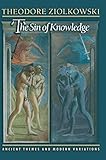The Sin of Knowledge : Ancient Themes and Modern Variations / Theodore Ziolkowski.
Material type: TextPublisher: Princeton, NJ : Princeton University Press, [2022]Copyright date: ©2001Description: 1 online resource (239 p.) : 7 halftonesContent type:
TextPublisher: Princeton, NJ : Princeton University Press, [2022]Copyright date: ©2001Description: 1 online resource (239 p.) : 7 halftonesContent type: - 9780691223940
- Mythology in literature
- LITERARY CRITICISM / General
- Adapa
- Aeschylus
- Anacreon
- Anaxagoras
- Apollodorus
- Beethoven, Ludwig van
- Berman, Marshall
- Borrow, Anthony
- Camerarius, Joachim
- Cleisthenes
- Dali, Salvador
- Damn Yankees
- Dickens, Charles
- Don Juan
- Dyson, Freeman
- Edwards, Jonathan
- Erasmus, Desiderius
- Greene, Graham
- Hamlet
- Heine, Heinrich
- Herodotus
- Herseyjohn
- Hesiod
- Institoris, Heinrich
- Jerome, Saint
- Jerusalem
- Jonson, Ben
- Keim, Andrew
- Kirsch, Rainer
- Klinger, Max
- Kreitzer, Larry
- Kupelwieser, Leopold
- Legenda Aurea
- Mailer, Norman
- Mainzer, Otto
- Malleus Maleficorum
- Melanchthon, Philipp
- Napoleon
- Nono, Luigi
- Olson, Elder
- Orff, Carl
- Paul, Saint
- Peisistratus
- Poussin, Nicholas
- Prometheia
- Quinet, Edgar
- biblical criticism
- chapbook
- curiositas
- etiology
- forbidden knowledge
- pact with devil
- PN56.M95
- PN56.M95
- online - DeGruyter
| Item type | Current library | Call number | URL | Status | Notes | Barcode | |
|---|---|---|---|---|---|---|---|
 eBook
eBook
|
Biblioteca "Angelicum" Pont. Univ. S.Tommaso d'Aquino Nuvola online | online - DeGruyter (Browse shelf(Opens below)) | Online access | Not for loan (Accesso limitato) | Accesso per gli utenti autorizzati / Access for authorized users | (dgr)9780691223940 |
Frontmatter -- Content -- Illustrations -- Preface -- Prelude. The Timeless Topicality of Myth -- Part One. Ancient Themes -- Chapter One. Adam: The Genesis of Consciousness -- Chapter Two. Prometheus: T h e Birth of Civilization -- Chapter Three. Faust: The Ambivalence of Knowledge -- Interlude. From Mith to Modernity -- Part Two. Modern Variations -- Chapter Four. The Secularization of Adam -- Chapter Five. The Proletarianization of Prometheus -- Chapter Six. The Americanization of Faust -- Postlude. On the Uses and Abuses of Myth -- Notes -- Bibliography -- Index
restricted access online access with authorization star
http://purl.org/coar/access_right/c_16ec
Adam, Prometheus, and Faust--their stories were central to the formation of Western consciousness and continue to be timely cautionary tales in an age driven by information and technology. Here Theodore Ziolkowski explores how each myth represents a response on the part of ancient Hebrew, ancient Greek, and sixteenth-century Christian culture to the problem of knowledge, particularly humankind's powerful, perennial, and sometimes unethical desire for it. This book exposes for the first time the similarities underlying these myths as well as their origins in earlier trickster legends, and considers when and why they emerged in their respective societies. It then examines the variations through which the themes have been adapted by modern writers to express their own awareness of the sin of knowledge. Each myth is shown to capture the anxiety of a society when faced with new knowledge that challenges traditional values. Ziolkowski's examples of recent appropriations of the myths are especially provocative. From Voltaire to the present, the Fall of Adam has provided an image for the emergence from childhood innocence into the consciousness of maturity. Prometheus, as the challenger of authority and the initiator of technological evil, yielded an ambivalent model for the socialist imagination of the German Democratic Republic. And finally, an America unsettled by its responsibility for the atomic bomb, and worrying that in its postwar prosperity it had betrayed its values, recognized in Faust the disturbing image of its soul.
Mode of access: Internet via World Wide Web.
In English.
Description based on online resource; title from PDF title page (publisher's Web site, viewed 29. Jun 2022)


